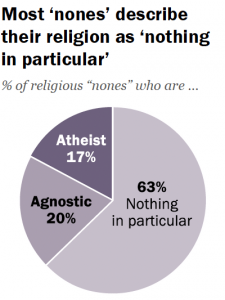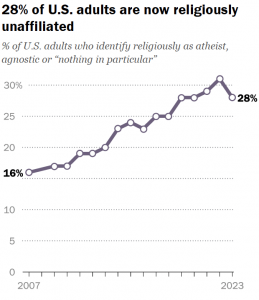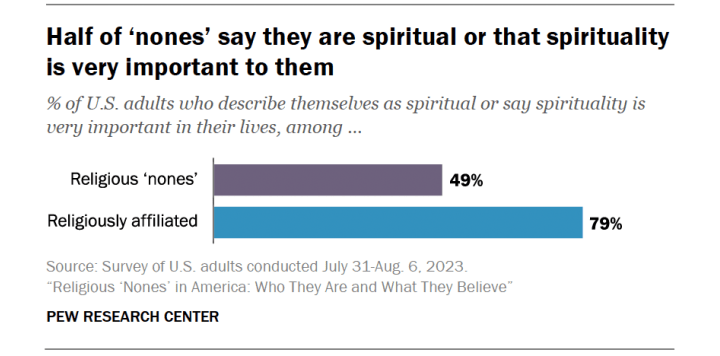I interact with the “nones” nearly every week, and I’m constantly surprised at how religious they are.
In recent years, American religious leaders have been obsessed with classifying, describing, understanding, discussing and evangelizing the “nones,” those people who when asked on surveys what their religious affiliation is answer by saying, “none.”
The “nones” not only are the fastest-growing religious group in America, they now account for 28% of U.S. adults, according to Pew Research. Pew gets so many questions about the “nones” that they put out a special report last week to address the most common questions.
Pew summarized the big findings from its data:
- Most “nones” believe in God or another higher power. But very few go to religious services regularly.
- Most say religion does some harm, but many also think it does some good. They are not uniformly anti-religious.
- Most “nones” reject the idea that science can explain everything. But they express more positive views of science than religiously affiliated Americans do.
- Surveys have consistently shown that many Americans view religion’s declining influence in society as a bad thing. “Nones” tend to vote less often, do less volunteer work in their communities and follow public affairs at lower rates than religiously affiliated people do.
This lines up with my own experience interacting with the “nones.” Even though my vantage is a bit unique.
I meet the “nones” at funerals. Not only that, I officiate funerals and memorial services for them because — being “nones” — they have no pastor or church to call. So they enlist people like me to do what I lovingly call “pick-up funerals.”
 Here’s my most important finding: Out of several hundred funerals I’ve officiated for families who had no church and no pastor to call, I can think of only three that would call themselves “secular” and requested no religious emphasis at the service. And one of those hired a harpist to play “Ave Maria.” So much for a secular service.
Here’s my most important finding: Out of several hundred funerals I’ve officiated for families who had no church and no pastor to call, I can think of only three that would call themselves “secular” and requested no religious emphasis at the service. And one of those hired a harpist to play “Ave Maria.” So much for a secular service.
Many of the people I meet have become “nones” through very understandable paths. Typically, they were raised in church but stopped going as young adults. Or they grew so old that the pastor they knew was gone and perhaps the church they knew closed and they never connected anywhere else. Or they had a bad experience, were rejected, felt cast off, discovered a love for Sunday brunch. Or life just carried them down a different path. A surprising large percentage of the adult children of the deceased I eulogize are gay or lesbian — and they’re often afraid to tell me, the “minister,” that information.
Yet 99% of these people I meet want a religious funeral service.
Now, granted, I live in the heart of the Bible Belt. What’s true in Dallas may not be true in Seattle. And I’m dealing with people who actually want to have a funeral service, which means I don’t see those who do their own things or skip a service altogether.
Among the people I meet, though, most are not unchurched. They are instead de-churched.
When it comes to a funeral, they want to hear “Amazing Grace” and “Go Rest High on that Mountain,” and they are strangely conversant with contemporary Christian music and the religious side of country music. So much country music. And a lot of Elvis.
This lines up with Pew’s findings on who the “nones” really are: “In our latest data, 17% of ‘nones’ identify as atheist, 20% say they are agnostic and 63% choose ‘nothing in particular.’”
So of the 28% of Americans who are “nones,” only 17% of that group are atheists and 20% agnostic. That’s about 10% of all Americans.
The Pew data show: “When asked directly why they are not religious, two-thirds of ‘nones’ say they question a lot of religious teachings or don’t believe in God. Many also bring up criticisms of religious institutions or people, including 47% who say that one extremely or very important reason why they are not religious is that they dislike religious organizations. And 30% say bad experiences they’ve had with religious people help explain why they are nonreligious.”
 No wonder these people aren’t calling up a pastor they know to officiate a funeral. They may believe in God — often vocally — but they don’t trust or need the church. And as a result, their understandings of what makes a person “religious” or even “saved” wouldn’t pass muster with most orthodox Christianity.
No wonder these people aren’t calling up a pastor they know to officiate a funeral. They may believe in God — often vocally — but they don’t trust or need the church. And as a result, their understandings of what makes a person “religious” or even “saved” wouldn’t pass muster with most orthodox Christianity.
Recently, multiple family members and friends of one dearly departed we were celebrating declared with certainty that she had “found God” because in her last days she posted Bible verses on Facebook every day. They needed no other evidence because their faith had found a resting place on social media.
Others cite deeds of love and compassion and care as evidence of a spiritual life. They speak of the fruit of the Spirit but not the Spirit.
And herein lies the danger in an expanding world of religious “nones”: Everybody makes up their own idea of what it means to be religious or Christian or “saved” or going to heaven.
Here’s what Pew says: “Not all ‘nones’ are nonbelievers. They are far less likely than religiously affiliated Americans to say they believe in God ‘as described in the Bible,’ but most do believe in God or some other higher power. Just 29% reject the notion that there is any higher power or spiritual force in the universe.
“Most ‘nones’ say they were raised in a religion, usually Christianity. Yet today, they tend to be disconnected from religious institutions. Not only have they shaken off religious labels, they also have largely shaken off involvement in churches, synagogues, mosques and other religious organizations.”
No surprise then that 90% of religious “nones” tell Pew researchers they seldom or never go to religious services.
Pew has delved into how the “nones” view morality, and here’s the result: “The vast majority of ‘nones’ say it is possible to be moral and have good values without believing in God. Most religiously affiliated people agree, though by a smaller margin.
“When asked how they decide between right and wrong, 83% of ‘nones’ say the desire to avoid hurting other people is a key factor. And 82% of ‘nones’ say logic and reason are extremely or very important when they decide between right and wrong.”
This it is not surprising that at these funerals I speak more often about “love” than I typically do at a church funeral.
“What we are beginning to see in America today is multi-generational ‘none’-ness.”
Here’s one other important finding from Pew: “The population of religious ‘nones’ in the U.S. is younger than the population of Americans who identify with a religion. Among ‘nones,’ 69% are under the age of 50, while 31% are 50 or older. By comparison, 45% of U.S. adults who identify with a religion are under 50, while 55% are ages 50 or older.”
What we are beginning to see in America today is multi-generational “none”-ness.
Consider the math: One adult falls away from church but has three children who then are not raised in church. Those three children become adults and collectively raise maybe eight or nine children who are not raised in church. Thus in the shift of just two generations the share of “nones” has grown exponentially.
This is why so many alarm bells are sounding about the rise of the “nones” in American life.
And yet, I also see the dearth of biblical literacy exhibited by people who swear their mothers took them to church every Sunday as children. One such man recently told me in preparing for his mother’s service: “I can’t remember her favorite Bible verse, but I know it’s in the book of Philippines.”
Related articles:
What to do with the nones? | Opinion by Bill Wilson
Templeton Foundation funds first-of-its-kind research into the religious ‘nones’


